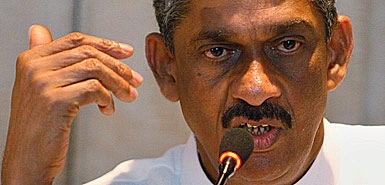 The head of a Commonwealth observer mission to Sri Lanka said that the government had damaged its international reputation by deploying troops around the main opposition candidate’s hotel headquarters during vote-counting for a presidential election.
The head of a Commonwealth observer mission to Sri Lanka said that the government had damaged its international reputation by deploying troops around the main opposition candidate’s hotel headquarters during vote-counting for a presidential election.
K D Knight, the former Jamaican Foreign Minister who led the mission, expressed concern about the abuse of state media and other government resources in the pre-election period by Mahinda Rajapaksa, the incumbent who was declared the winner yesterday.
He told The Times that the abuses did not “substantially affect” the results of the first presidential election since the defeat of the Tamil Tigers in May but did affect its freeness and fairness, as well as Sri Lanka’s reputation inside and outside the Commonwealth.
“Until such problems are addressed the electoral process in Sri Lanka will not fully meet key benchmarks for democratic elections,” he said, urging the government to implement an overdue constitutional amendment that would de-politicise state institutions.
President Rajapaksa won 57.9 per cent of the vote but General Sarath Fonseka, his former army chief and runner-up, is contesting the result and accusing the Government of endangering his life by removing his security detail.
The Commonwealth was the only major international organisation to send election monitors and the only authoritative arbiter regarded as impartial by the main candidates.
Its concerns were echoed, however, by the Centre for Monitoring Election Violence, the only one of three local monitoring organisations to have issued a preliminary report so far.
Mr Knight said that he was concerned when he heard that troops had surrounded the Cinnamon Lakeside Hotel in Colombo, where General Fonseka and opposition leaders were staying.
“It created a negative image. What was the message that was sent? Deploying 400 security personnel unnecessarily is an abuse of state resources,” he said, adding that his team was still trying to clarify whether the deployment was necessary.
The army said that it sent the troops because the General was inside with 400 people, including armed deserters who might be planning a coup.
Reporters and tourists inside saw no sign of the armed men, although the General handed over nine guards who he said were retired soldiers. Mr Knight also expressed concern about General Fonseka’s discovery on polling day that he was not registered to vote, despite claiming to have completed the necessary procedures.
“It appears that this matter was raised in an attempt to influence voters not to support General Fonseka because if he’d been ineligible these would have been votes thrown away,” Mr Knight said.
The independent elections commissioner ruled that General Fonseka was still allowed to run but the Government refused to accept that and said it would challenge his candidacy in court.
Mr Knight also questioned the Government’s decision to remove 70 soldiers, who have been protecting General Fonseka from attack.
“It would have possibly been judicious to allow his security detail for a period beyond the announcement of the results,” he said.
The General left the hotel, without security, on Wednesday night and spent today under lockdown at his residence, protected by private security guards.
Allies said that he did not want to leave the country but might have to unless he bowed to government pressure to stop disputing the election result.
The General has US residency rights and two daughters studying in Oklahoma. However, he could face war crimes charges in the US.
(For updates you can share with your friends, follow TNN on Facebook and Twitter )
